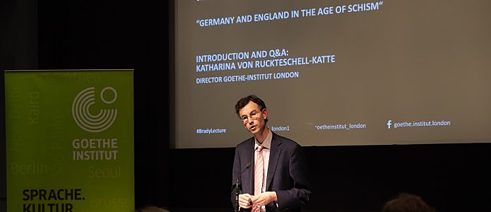Brady Lecture 2018
Germany and England in the Age of Schism

Europe is facing a new age of schism as it grapples with the enormous challenges brought about by Brexit, Trump and economic crisis. In this year’s Brady Lecture, Brendan Simms, professor of History of International Relations at Cambridge University, explained how Europe arrived at this point by discussing the key roles played by Germany and England.
“As the European crisis deepens, politicians, commentators and academics have reached for historical analogies to explain the present turbulence,” Simms said, in reference to commentators and politicians such as Boris Johnson who believe that the populism of the 1930s has resurfaced across the continent. Simms delivered an eloquent and insightful lecture at the Goethe-Institut London entitled “Germany and England in the Age of Schism” on November 27, and discussed how both nations have fared during periods of legal, religious and political turbulence during the past five centuries. The annual Brady Lecture is held at the Goethe-Institut London in memory of Philip Brady (1932-1997), an inspiring broadcaster, writer and lecturer.
Professor Brendan Simm's contribution to cultural exchange between Great Britain and Germany allowed him to offer a sharp analysis of Germany and England in the age of Putin, Trump and Brexit. His reflections emerged from his work at the Forum on Geopolitics at Cambridge University, as well as several books he has written on the subject.
The differing historical trajectories between England and Germany after the 1500s explain their contrasting approach to the European order today
Brendan Simms
During the lecture, Simms spelled out why it is foolish to equate the EU, which generally tries to safeguard human rights and the rule of law, with either the Soviet Union or the genocidal dictatorship of Adolf Hitler. “In fact, Hitler was exclusively and vigorously opposed to the concept of European integration,” he said. Dismissing most of the comparisons between Brexit and Nazi Germany, he instead cited the Reformation as a more valid analogy, which could help explain why Europe is facing such an uncertain future.
His analysis drew on both German and English examples of political tensions and their relevance to modern-day Europe: “The differing historical trajectories between England and Germany after the 1500s explain their contrasting approach to the European order today.”
Simms went on to explain that in Germany sovereignty was largely diffused and that religious strife ended in a compromise. “The contrasting German and English experiences since the Reformation also explain their fundamentally different attitudes to sovereignty within Europe. If the UK has been one of the great ordering powers in Europe, Germany has - with some spectacular exceptions - been a space to be ordered,” Simms added.
Due to its troubled history, Germany has, at best, been a co-ordering power over the past few decades, according to Simms. Britain, by contrast, has been the most central European actor which has helped to end world conflicts and negotiate crucial agreements.
Will the original clash of authority be furthered by a deepening cultural divide on the scale of the Reformation?
Brendan Simms
Through its EU membership, the UK remained closely involved in the political management of Europe, while also maintaining control of its borders and currency, Simms explained. “Some of the longstanding conflicts seemed to have been pacified by devolution settlements. In Northern Ireland, for example, the power-sharing assembly created under the Good Friday Agreement appeared stable,” he added.
In the present day, Germany maintains some influence in the EU, Simms pointed out. It is England, though, that has been one of the main drivers of the severe crisis facing the EU today, he added, largely due to its desire for more control over immigration and trade. As Brexit looms, it is less clear how England and the rest of the UK now fits into Europe.
Simms acknowledged that we have been left with more questions than answers. He stressed that although nobody can know the full implications of Brexit, we should always be wary of such a significant change in the order. “Will the Brexit project endure or will it be reversed?” he asked in conclusion. “Will the original clash of authority be furthered by a deepening cultural divide on the scale of the Reformation? History does not answer those questions, but it does give us a sense of the price to be paid if we get it wrong.”